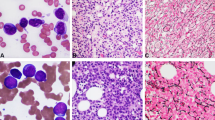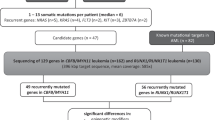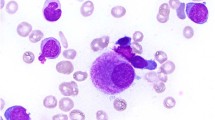Abstract
In acute myeloid leukemia (AML) with complex aberrant karyotype, a loss of one TP53 allele is frequently observed. We analyzed the incidence of TP53 mutations and deletions in 107 AML with complex aberrant karyotype. In 50 of 57 cases showing a loss of one TP53 allele, a TP53 mutation was detected in the remaining allele. In addition, in 33 of 50 cases with two TP53 copies, a TP53 mutation was found. Therefore, the frequency of TP53 mutations in AML with complex aberrant karyotype was 78%. In a second step, we analyzed TP53 mutations in a cohort of AML comprising different cytogenetic subgroups. TP53 mutations were detected in 33 of 235 cases (14%). Coincidences with other molecular mutations were rare. We confirmed a high incidence of TP53 mutations in AML with a complex aberrant karyotype (29/42, 69%) and demonstrated that TP53 mutations are very rare in AML without a complex aberrant karyotype (4/193, 2.1%).
This is a preview of subscription content, access via your institution
Access options
Subscribe to this journal
Receive 12 print issues and online access
$259.00 per year
only $21.58 per issue
Buy this article
- Purchase on Springer Link
- Instant access to full article PDF
Prices may be subject to local taxes which are calculated during checkout
Similar content being viewed by others
References
Vogelstein B, Lane D, Levine AJ . Surfing the p53 network. Nature 2000; 408: 307–310.
Fenaux P, Jonveaux P, Quiquandon I, Lai JL, Pignon JM, Loucheux-Lefebvre MH et al. P53 gene mutations in acute myeloid leukemia with 17p monosomy. Blood 1991; 78: 1652–1657.
Fenaux P, Preudhomme C, Quiquandon I, Jonveaux P, Lai JL, Vanrumbeke M et al. Mutations of the P53 gene in acute myeloid leukaemia. Br J Haematol 1992; 80: 178–183.
Preudhomme C, Fenaux P . The clinical significance of mutations of the P53 tumour suppressor gene in haematological malignancies. Br J Haematol 1997; 98: 502–511.
Stirewalt DL, Kopecky KJ, Meshinchi S, Appelbaum FR, Slovak ML, Willman CL et al. FLT3, RAS, and TP53 mutations in elderly patients with acute myeloid leukemia. Blood 2001; 97: 3589–3595.
Schoch C, Kern W, Kohlmann A, Hiddemann W, Schnittger S, Haferlach T . Acute myeloid leukemia with a complex aberrant karyotype is a distinct biological entity characterized by genomic imbalances and a specific gene expression profile. Genes Chromosomes Cancer 2005; 43: 227–238.
Schoch C, Haferlach T, Bursch S, Gerstner D, Schnittger S, Dugas M et al. Loss of genetic material is more common than gain in acute myeloid leukemia with complex aberrant karyotype: A detailed analysis of 125 cases using conventional chromosome analysis and Fluorescence in situ hybridization including 24-color FISH. Genes Chromosomes Cancer 2002; 35: 20–29.
ISCN. In: Mitelman F (ed). ISCN 1995, Guidelines for Cancer Cytogenetics, Supplement to: An International System for Human Cytogenetic Nomenclature. S. Karger: Basel, 1995, pp 1–110.
Suzuki T, Kiyoi H, Ozeki K, Tomita A, Yamaji S, Suzuki R et al. Clinical characteristics and prognostic implications of NPM1 mutations in acute myeloid leukemia. Blood 2005; 106: 2854–2861.
Christiansen DH, Andersen MK, Pedersen-Bjergaard J . Mutations with loss of heterozygosity of p53 are common in therapy-related myelodysplasia and acute myeloid leukemia after exposure to alkylating agents and significantly associated with deletion or loss of 5q, a complex karyotype, and a poor prognosis. J Clin Oncol 2001; 19: 1405–1413.
Pedersen-Bjergaard J, Christiansen DH, Desta F, Andersen MK . Alternative genetic pathways and cooperating genetic abnormalities in the pathogenesis of therapy-related myelodysplasia and acute myeloid leukemia. Leukemia 2006; 20: 1943–1949.
Byrd JC, Mrozek K, Dodge RK, Carroll AJ, Edwards CG, Arthur DC et al. Pretreatment cytogenetic abnormalities are predictive of induction success, cumulative incidence of relapse, and overall survival in adult patients with de novo acute myeloid leukemia: results from Cancer and Leukemia Group B (CALGB 8461). Blood 2002; 100: 4325–4336.
Grimwade D, Walker H, Oliver F, Wheatley K, Harrison C, Harrison G, et al., on behalf of the Medical Research Council Addult and Children's Leukemia Working Parties. The importance of diagnostic cytogenetics on outcome in AML: Analysis of 1612 patients entered into the MRC AML 10 trial. Blood 1998; 92: 2322–2333.
Grimwade D, Walker H, Harrison G, Oliver F, Chatters S, Harrison CJ, et al., on behalf of the Medical Research Council Addult and Children's Leukemia Working Parties. The predictive value of hierarchical cytogenetic classification in older adults with acute myeloid leukemia (AML): analysis of 1065 patients entered into the United Kingdom Medical Research Council AML 11 trial. Blood 2001; 98: 1312–1320.
Schoch C, Kern W, Schnittger S, Buchner T, Hiddemann W, Haferlach T . The influence of age on prognosis of de novo acute myeloid leukemia differs according to cytogenetic subgroups. Haematologica 2004; 89: 1082–1090.
Slovak ML, Kopecky KJ, Cassileth PA, Harrington DH, Theil KS, Mohamed A, et al., for the SWOG and ECOG. Karyotypic analysis predicts outcome of preremission and postremission therapy in adult acute myeloid leukemia: a Southwest Oncology Group/Eastern Cooperative Oncology Group study. Blood 2000; 96: 4075–4083.
Acknowledgements
We thank all clinicians for sending AML samples to our laboratory for diagnostic purposes.
Author information
Authors and Affiliations
Corresponding author
Rights and permissions
About this article
Cite this article
Haferlach, C., Dicker, F., Herholz, H. et al. Mutations of the TP53 gene in acute myeloid leukemia are strongly associated with a complex aberrant karyotype. Leukemia 22, 1539–1541 (2008). https://doi.org/10.1038/leu.2008.143
Received:
Accepted:
Published:
Issue Date:
DOI: https://doi.org/10.1038/leu.2008.143
Keywords
This article is cited by
-
Evaluation of apoptosis stimulating protein of TP53-1 (ASPP1/PPP1R13B) to predict therapy resistance and overall survival in acute myeloid leukemia (AML)
Cell Death & Disease (2024)
-
Unsupervised meta-clustering identifies risk clusters in acute myeloid leukemia based on clinical and genetic profiles
Communications Medicine (2023)
-
Novel germline mutation KMT2A G3131S confers genetic susceptibility to familial myeloproliferative neoplasms
Annals of Hematology (2021)
-
Genomic landscape in acute myeloid leukemia and its implications in risk classification and targeted therapies
Journal of Biomedical Science (2020)
-
Prognostic role of SCAMP family in acute myeloid leukemia
The Pharmacogenomics Journal (2020)



